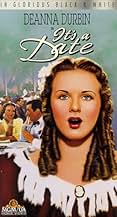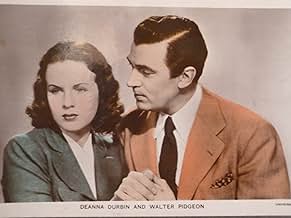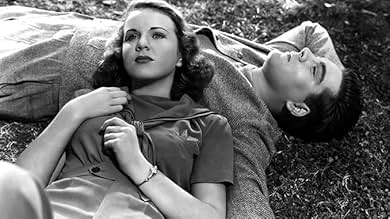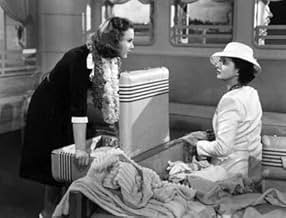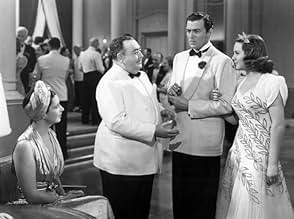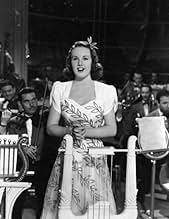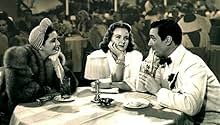Aggiungi una trama nella tua linguaAn aspiring actress is offered the lead in a major new play, but discovers that her mother, a more seasoned performer, expects the same part. The situation is further complicated when they b... Leggi tuttoAn aspiring actress is offered the lead in a major new play, but discovers that her mother, a more seasoned performer, expects the same part. The situation is further complicated when they both become involved with the same man.An aspiring actress is offered the lead in a major new play, but discovers that her mother, a more seasoned performer, expects the same part. The situation is further complicated when they both become involved with the same man.
- Regia
- Sceneggiatura
- Star
- Premi
- 4 vittorie totali
- Ship's Steward
- (non citato nei titoli originali)
Recensioni in evidenza
When Durbin does get a chance to sing, she's great. She puts over all of her songs with professional skill and poise, doing an absolute standout job on "Ave Maria" and "Musetta's Waltz"--but the trouble is not enough time is spent on the vocals to showcase her amazing voice. Instead, we get Kay Francis and Walter Pidgeon falling in love while Deanna dreams up all sorts of schemes to keep her mother from knowing that she has won her mother's role in a play.
Deanna looks lovely at eighteen and has probably never been photographed more beautifully but this is the sort of vehicle that has you wishing the silly plot would move on so we can hear Durbin sing once more. Walter Pidgeon and Kay Francis are adequate in support. MGM later came up with a zestier technicolored remake called "Nancy Goes To Rio" with Jane Powell.
Trivia note: This was S.Z. Sakall's first screen appearance in an American film.
This was the seventh movie Deanna Durbin made with producer Joe Pasternak and cameraman Joseph Valentine, and the well was running dry. This drivel would give anyone with an IQ above 70 a raging headache--even in 1940. It's a trite tale of a mother (Francis) and daughter (Durbin) in love with the same man (Pigeon) as well as mother and daughter vying for the same leading role in a Broadway play. It's nonsense with neither an ounce of plausibility nor a single bit of wit, though it fancies itself a comedy. The very contrived plot is arranged to provide Durbin with a ridiculous assortment of songs: "Musetta's Waltz" from La Boheme, Schubert's "Ave Maria," "Loch Lomond," and a bland new ballad, "Love Is All." Kay Francis was looking quite fine here, though the costume designer should have been shot for giving her unflattering turban hats.
This was the first American film that S. Z. "Cuddles" Sakall appeared in, though he didn't have his nickname at that time. He was playing the sort of part here that he played throughout his Hollywood career.
And the film reminded me of what an insipid actor Walter Pigeon was.
Deanna is fledgling actress Pamela Drake, daughter of major Broadway star Georgia (Kay Francis). She works in a small regional theater but unexpectedly gets the chance to star on Broadway herself. Seeking seclusion in order to prepare for her big break, she heads home to Hawaii to spend some time with her mother. On the ship, she meets pineapple tycoon John Arlen (Walter Pidgeon), who first woos her but then also becomes interested in mama. It turns out that Georgia also expects to get the part already offered to Pamela and also wants John. Who gets the part? More importantly for these types of films, who gets the man?
Durbin is amazing, as always, and really gets the chance to show what a child prodigy she was (though clearly becoming a young woman here). She sings several standards such as "Loch Lomond" and "Ave Maria" with her fine soprano voice, and shows maturity far, far beyond her years. If you aren't familiar with Durbin, be prepared to be dazzled by her talent. There's one fine bit where Deanna, trying to convince the big-time producers (including S.Z. Sakall doing his usual hammy bit) to hire her for their show, does several wildly different characterizations in rapid-fire succession which are all excellent. Great acting talent, great singing voice, prettier in a classic sense than Judy Garland, Deanna was the complete package.
Pidgeon is great also, but he is up against formidable competition in the acting department here. He exudes his usual avuncular charm, and actually has some dashing moments on the ship to Hawaii as he tries to woo Pamela. Later, though, he appears bewildered at times, despite supposedly being the one in charge. Kay Francis is the clear loser. She is completely outclassed by Durbin, and is clad in weird fashions such as turbans that make her look dowdy and out of place, especially in a Hawaiian setting. It is difficult to believe that Arlen would choose her over Pamela. Plus, she is given almost no chance to do anything but sit and wait for John and Pamela to decide things for her, so her character and motivations are murky.
Durbin gets to sing several times with her beautiful operatic voice, and she gets to emote repeatedly both as her own character and as the character she is playing within the story. Plus, she has several supremely Diva moments ("I am through with men!"), culminating in the glorious opportunity to stalk off in a huff, the battle won but the war lost. The reality, though, is that she is still just a kid playing in a grown-up world, a fight the real Deanna would be waging until she finally gave it all up and left films altogether later in that decade, hopefully for a happier life without the strain of constantly meeting her own and others' extraordinary expectations for herself.
Ignore the story, but don't ignore Deanna, a true star.
Deanna plays Pamela Drake and Kay Francis plays her mother, Georgia. Georgia is already a famous and accomplished actress and Pamela dreams of becoming one herself. Well, it soon looks like Pamela's dreams will come true when she reads for a relatively small part--but they offer her the lead! However, she needs to cram and learn the part and goes on a cruise. During this trip, she stays to herself and works on her lines but the Captain and a guest, John Arlen (Walter Pidgen) see her talking to herself and don't know she's rehearsing! They think, incorrectly, that she's really depressed--and John decides to use a scheme to get her to focus on him and his supposed problems. He hasn't got any problems and soon she sees through his ruse--but they become good friends.
When they land, Pamela introduces John to her mother--and tells her that she is in love with John, although he's twice her age. However, over time you aren't certain WHICH lady John is smitten with but things get worse. Soon Pamela realizes that her mother ALSO thinks she's getting the same part that Pamela is rehearsing for--and she doesn't want to disappoint her mother. So what's going to happen? See this cute little family comedy.
As far as Deanna Durbin films go, it's a bit better than average due to a nice cast. In particular, although it's a relatively small role, it's also the first for S. Z. 'Cuddles' Sakall---one of the most likable supporting actors in history. This alone make it a must-see!
By the way, I would love to know what audiences of the day thought about their sweetheart, Miss Durbin, falling for an old guy like Pidgeon. I know that a similar May-December pairing in "That Hagen Girl" was NOT good and audiences hated the film. I think seeing a young lady who everyone adored as a child now with a much older man was just too much-- and this might have also been a problem with Durbin.
Lo sapevi?
- QuizS.Z. Sakall's American film debut.
- BlooperWhen John Arlen enters Pamela's room with her dress, she is fixing her hair and a hand mirror is on the vanity table close to the table mirror. But on the next cut, the hand mirror has changed position and is now partially sticking over the edge of the table.
- Citazioni
Karl Ober: I can't work in New York anyway. Is this place far from here?
Pamela Drake: Oh, no, Mr. Ober, it's only Maine. You know where Maine is!
Karl Ober: No.
Pamela Drake: Oh, it's practically a few minutes from here! You could write fine there.
Sidney Simpson: 'A few minutes'!
Pamela Drake: [to Sidney, blithely] Yes!
[to Ober]
Pamela Drake: That's all, really.
Karl Ober: [wagging his finger] Then it isn't quiet enough. I have to go further away from New York.
Pamela Drake: Oh, good - it *is* far away! Takes a whole day to get there.
[to Sidney, brightly]
Pamela Drake: Really, I'm an awful liar, aren't I?
Sidney Simpson: Yes.
- ConnessioniEdited into Gems of Song (1949)
- Colonne sonoreLove is All
(1940)
Music by Pinky Tomlin
Lyrics by Harry Tobias
Piano: Cecilia Loftus (uncredited)
Sung by Deanna Durbin (uncredited)
I più visti
Dettagli
Botteghino
- Budget
- 867.000 USD (previsto)
- Tempo di esecuzione1 ora 43 minuti
- Colore
- Proporzioni
- 1.37 : 1
Contribuisci a questa pagina



